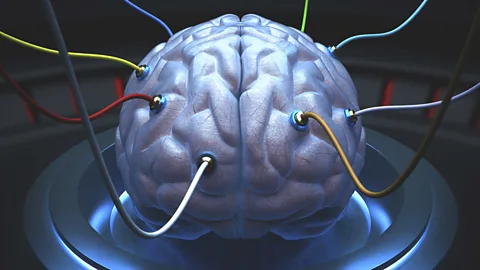Zapping your brain for self-improvement
 Getty Images
Getty ImagesThe best of the week’s long reads in science and technology, including electrifying neuroscience and the ethics of using Nazi data.
Power | End of the miracle machines
The coal-fired Navajo Generating Station in Arizona lifts trillions of gallons of water from the Colorado River to supply distant Tucson and Phoenix. But Navajo is “more a caution than a marvel, showing how much energy it takes to move water through an artificial river system, and the unforeseen damage produced by doing so”. A hundred dams and reservoirs drain the Colorado. The river has been engineered almost to death. (Abrahm Lustgarten, Pro Publica, 4,800 words)
Helium is wildly undervalued, and thus used casually for cleaning fuel-tanks and blowing up party balloons. For the past decade America has flooded the market by liquidating the strategic helium reserve established during World War Two. That’s now over and the correction will be massive. “Party balloons filled with helium should really cost about $100 to reflect the precious nature of the gas they contain.” (Rosie Cima, Priceonomics, 1,545 words)
Neuroscience | Zapping the brain for self-improvement
Should you run an electric current through your brain? Yes, say amateurs of transcranial direct current stimulation. Do the wiring yourself, or buy a box for £60 ($95). A zappee says: “Everything went empty in a good way. I felt chilled inside. It was a mad sensation and an out-of-body experience.” A doctor says: “What we can say about tDCS is that it does change how our brain works. We can say that with certainty.” (Lucy Jones, Long+Short, 3,300 words)
Biotechnology | Towards the body on a chip
Biotech companies are starting to commercialise “organ chips” — miniature versions of human organs grown from stem cells — for use in drug research and clinical trials. A lung-chip comes in a plastic sandwich the size of a USB stick. “This use of stem cells raises the possibility of a device that represents an individual patient — a patient-on-a-chip, if you like. In this case all the tiny organs would be derived from a single person.” (Science & Technology, The Economist, 1,460 words)
Ethics | Is it ethical to use Nazi data?
Nazi doctors had “unfettered access” to human beings for experiments, some of which yielded scientifically sound data – for example, on the manner in which people freeze to death. Is it justifiable for later scientists to use knowledge gained by murder and torture? Yes, if it helps to save lives. But make clear how the data was obtained. Using the data while obscuring the source, the practice in the past, can only be wrong. (Lynn Gillam, Practical Ethics, 918 words)
Coding | What is code?
This is a book, really: Computing for Beginners. Not for every beginner, but for anybody in a management job who cannot write code and thus is completely at the mercy of developers who can. It explains why every two years your company is racing to catch up with some new internet thing, the work goes twice over budget, and it never actually gets finished before the next thing comes along. Come to think of it, this is the new Two Cultures. (Paul Ford, Bloomberg Businessweek, 38,000 words)
Food | African take-aways
Main points from 50 papers presented at a World Bank conference on development - and sometimes dramatic events - in Africa. “When a mine opens in South Africa, crime doesn’t increase. But you may not want to be around when the mine closes.” Or: “Higher rainfall significantly reduced civilian participation in the [Rwandan] genocide." And: “Members of ethnic groups exposed to greater historical missionary activity [in 19th Century Nigeria] express significantly less trust today.” (David Evans et al, Development Impact, 1,850 word)
For more articles worth reading, visit The Browser. If you would like to comment on this, or anything else you have seen on Future, head over to our Facebook or Google+ page, or message us on Twitter.
